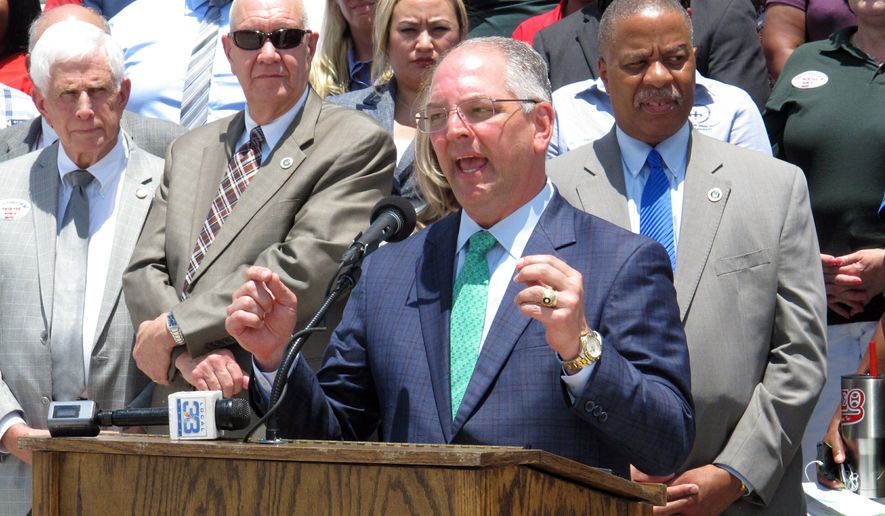Louisiana Gov. John Bel Edwards says he plans to sign a fetal-heartbeat bill passed by the state legislature, breaking with the Democratic Party on the pivotal abortion issue.
Shortly after legislators gave final passage to Senate Bill 184, the Democratic governor reminded voters that he has never made any secret of his abortion views, running in 2015 “as a pro-life candidate after serving as a pro-life legislator for eight years.”
“I know there are many who feel just as strongly as I do on abortion and disagree with me — and I respect their opinions,” said Mr. Bel Edwards in a Wednesday statement.
My statement on the passage of SB 184 following final passage by the Louisiana Legislature. #lalege #lagov pic.twitter.com/SxadrmuUTC
— John Bel Edwards (@LouisianaGov) May 29, 2019
With his signature, Louisiana would join a dozen red states in passing tough new restrictions this year on abortion access, many of them aimed at challenging the Supreme Court’s 1973 Roe v. Wade decision as the court grows more conservative.
Republican governors in four states have signed into law fetal heartbeat bills, which prohibit most abortions after about six weeks’ gestation, or after the time in which a fetal heartbeat can be detected. Such laws in Kentucky and Mississippi have already been blocked by judges pending court battles.
Other states expanding abortion restrictions include Missouri, which approved a ban on most abortions after eight weeks’ pregnancy, and Alabama, which passed a two-week ban, the most restrictive in the nation.
Mr. Bel Edwards would apparently become the first Democrat to sign a fetal-heartbeat bill. In 2013, such legislation became law in Arkansas after the Republican legislature overrode the veto of Democratic Gov. Mike Beebe.
The Arkansas law was overturned the following year in federal court.
Red-state Louisiana has a history of bipartisan support for pro-life legislation. In 2006, Democratic Gov. Kathleen Blanco signed a “trigger” bill, which would outlaw most abortions if Roe is overturned.
The Louisiana bill, which won House approval Wednesday on a bipartisan 79-23 vote, calls for doctors who violate the law to face criminal penalties and risk losing their medical license.
BREAKING: ’Fetal heartbeat’ abortion bill passes La. Househttps://t.co/TitnvmNDWT
— KPLC (@KPLC7News) May 29, 2019
The bill includes no exceptions for rape or incest, but does allow abortions to “prevent the death of a pregnant woman or to prevent a serious risk of the substantial and irreversible impairment of a major bodily function.”
The Louisiana bill would only become law if Roe is overturned or if the Mississippi fetal-heartbeat measure is deemed constitutional.
Alanah Odoms Hebert, ACLU of Louisiana executive director, condemned the “abortion ban,” calling it “part of a concerted national effort to criminalize abortion.”
“After years of attacks on abortion access, Louisiana politicians have now sunk to a new low with an extreme ban that would outlaw abortion before many women know they are pregnant,” she said.
Louisiana Right to Life Executive Director Benjamin Clapper commended the state legislature after passage of the House bill.
“Abortion stops the beating heart of a precious unborn child, and our nation must bring an end to this injustice,” he said in a statement. “We look forward to Governor John Bel Edwards signing this bill into law.”
• Valerie Richardson can be reached at vrichardson@washingtontimes.com.




Please read our comment policy before commenting.